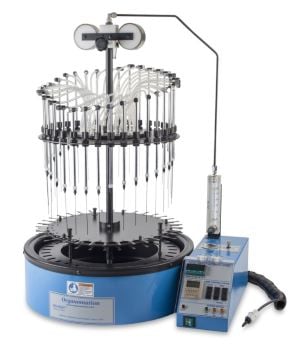Product Information, Sample Concentration Options
/ Sarah Johnson
There are various safety procedures in place to ensure the protection of lab technicians when working with corrosive solvents - wearing proper PPE, establishing secure storage and labelling practices, using a good ventilation system, etc. These are undeniably crucial measures all laboratories should take when working with hazardous materials, but what about the safety of your sample preparation equipment? Your equipment is at high risk for solvent damage and must be protected, just like you.
All Organomation instruments are made of 304 stainless steel, 316 stainless steel, and anodized aluminum, all of which are at a high risk for deterioration due to corrosive solvents. In order to ensure the longevity and durability of our equipment, we have an acid resistant coating that is available for all of our instruments. This coating acts as an external barrier to prevent solvent damage due to exposure, and is represented by our instrument option code -RT. 
Both Teflon and epoxy are used to make our instruments acid resistant. A blue epoxy coating is used on the outer bath cases and a black Teflon coating is used on inner water bath pans, needles, and some manifold parts. Any and all surfaces that are at risk for coming in contact with solvent is protected.
So how do you know if you'll require an acid resistant coating on your sample concentrator? It can be a bit tricky since there are so many external factors to consider. The term corrosive refers to any chemical that will deteriorate or dissolve another material. These chemicals can be strong acids, bases, or oxidizers.
Although acidic attack is mainly determined by the pH level, this is not the only deciding factor. It's also important to look at it's oxidization, the level of dissolved oxygen, the temperature, along with many other considerations. These same considerations apply for strong bases. Oxidizers have less to do with pH level, and more to do with chemical compatibility. There are some solvents that are neither acidic or basic, yet can create chemical reactions when coming in contact with certain materials.
Since there is no one true way to determine whether your solvents will require a corrosion resistant coating, we created a chart to make it easy. Our solvent compatibility chart has a list of the most common solvents used in sample preparation methods. Beside each name, you will see a recommendation on whether this solvent does or does not require a Teflon coating (-RT option code).
If you will be using a solvent that is not listed on this chart, please reach out to sales@organomation.com where an Organomation employee can provide informed guidance.
You can also set up a free consultation with an Organomation employee to discuss your sample preparation needs further and to determine which instrument is best for your application.
